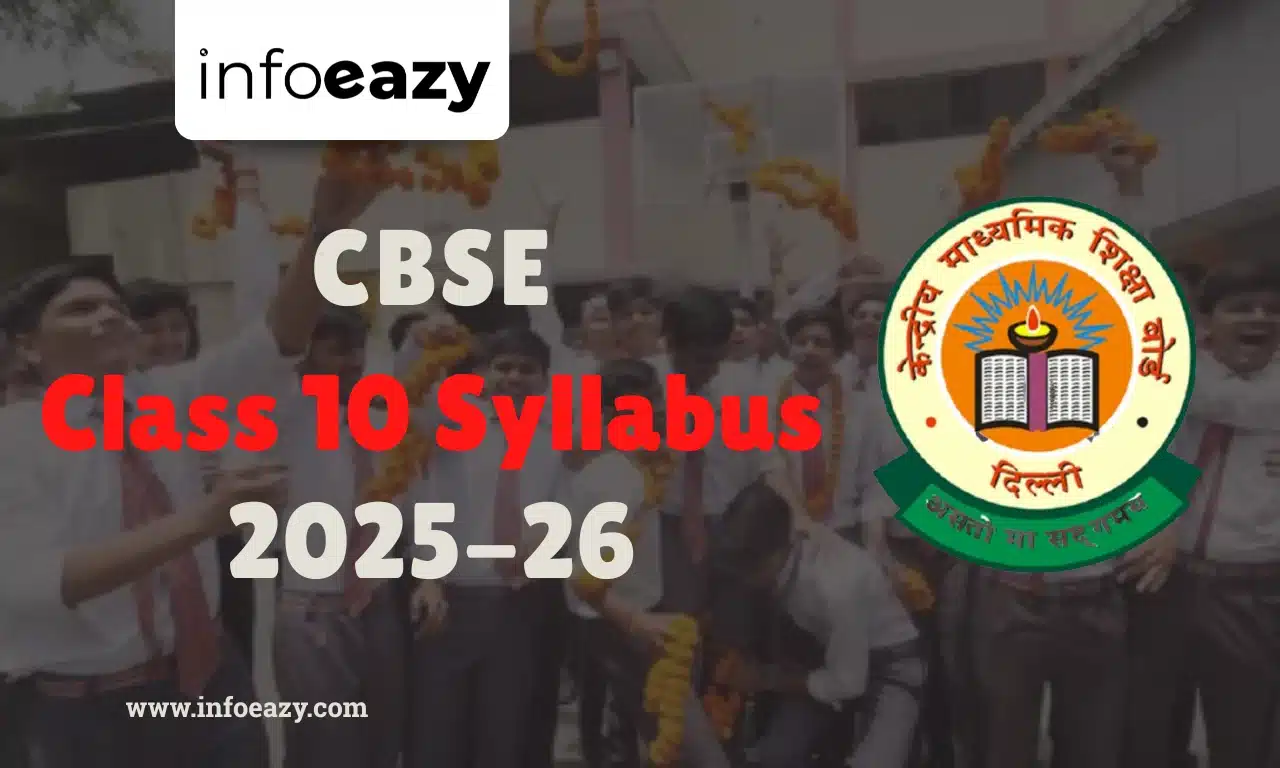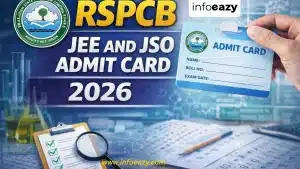The CBSE Class 10 Syllabus 2025–26 is designed to guide students through subjects like Mathematics, Science, Social Science, and Languages, helping them prepare effectively for the board exams. With two board exams conducted every year, students now have multiple opportunities to appear for the exams. The syllabus covers all key topics and provides a structured approach to learning. For further details, students should refer to the official CBSE website.
CBSE Class 10 Syllabus 2025-26
The CBSE Class 10 Syllabus 2025-26 provides a clear understanding of the topics to be studied throughout the academic year. It covers all major subjects like Maths, Science, English, Social Science and Hindi. Students can access the detailed syllabus on the official CBSE website: cbseacademic.nic.in. or from the article below.
| CBSE Class 10 Syllabus 2025-26 | |||
| Stream | Core Subjects | Elective Subjects | Assessment Pattern |
| All Streams | English Language & Literature, Hindi (Course A/B), Mathematics (Standard/Basic), Science, Social Science | Computer Applications, Home Science, Artificial Intelligence, Sanskrit, Urdu, Painting | Theory (80 marks) + Internal Assessment (20 marks) 3 hours exam duration |
| No specific stream division | Class 10 does not have fixed streams like Class 11–12. Students study a broad set of compulsory and optional subjects. | Students can choose one skill or elective subject based on interest and availability. | Internal Assessment: Periodic Tests (10), Notebook Submission (5), Activities (5) |
CBSE Class 10 Syllabus 2025-26 Overview
Candidates who are in Class 10 can check the CBSE Class 10 Syllabus 2025-26 Overview table which includes mode of exam, subjects, passing criteria etc.
| CBSE Class 10 Syllabus 2025-26 Overview | |
|---|---|
| Mode of Examination | Pen and paper (offline) |
| Total Marks per Subject | 100 marks (80 marks for theory + 20 marks for internal assessment) |
| Passing Criteria | Minimum 33% marks in both theory and internal assessment separately |
| Question Types | Competency-Based Questions: 50% (includes MCQs, case-based, source-based, and situation-based questions); MCQs: 20%; Short/Long Answer Questions: 30% |
| Subjects Covered | English, Hindi (Course A & B), Mathematics (Standard & Basic), Science, Social Science, Computer Applications, and others |
| Internal Assessment | 20 marks per subject, comprising periodic tests, notebook submissions, and subject enrichment activities |
CBSE Class 10 Syllabus 2025-26 Science
The CBSE Class 10 Syllabus 2025-26 Science includes topics from Physics, Chemistry, and Biology to build a strong foundation in scientific concepts. The detailed Science syllabus is provided below in the table.
| CBSE Class 10 Syllabus 2025-26 Science | ||
| Unit | Unit Title | Chapters & Key Subtopics |
| I | Chemical Substances – Nature and Behaviour (25 Marks) | 1. Chemical Reactions and Equations: Types of chemical reactions, writing and balancing chemical equations, effects of oxidation reactions in everyday life.
2. Acids, Bases, and Salts: Properties, reactions, pH scale, uses of salts. 3. Metals and Non-metals: Properties, reactivity series, corrosion, prevention. 4. Carbon and Its Compounds: Covalent bonding, homologous series, nomenclature, ethanol, ethanoic acid, soaps and detergents. 5. Periodic Classification of Elements: Mendeleev’s and Modern Periodic Table, trends. |
| II | World of Living (25 Marks) | 6. Life Processes: Nutrition, respiration, transportation, excretion.
7. Control and Coordination: Nervous system, coordination, hormones. 8. How Do Organisms Reproduce?: Modes, human reproduction, health. 9. Heredity and Evolution: Mendel’s laws, sex determination, evolution. |
| III | Natural Phenomena (12 Marks) | 10. Light – Reflection and Refraction: Mirrors, lenses, refraction, formulas, power of a lens.
11. The Human Eye and the Colourful World: Eye structure, defects, prism, dispersion, scattering. |
| IV | Effects of Current (13 Marks) | 12. Electricity: Current, Ohm’s law, resistance, series and parallel circuits, heating effect, electric power.
13. Magnetic Effects of Electric Current: Magnetic field, right-hand rule, motor, generator, electromagnetic induction, household circuits. |
| V | Natural Resources (5 Marks) | 14. Our Environment: Ecosystem, food chains, ozone, waste management. 15. Sustainable Management of Natural Resources: Conservation, water harvesting, coal and petroleum. |
CBSE Class 10 Syllabus 2025-26 Maths
The CBSE Class 10 Syllabus 2025-26 Maths is designed to help students build strong problem-solving and logical thinking skills. The chapter and key subtopics have been highlighted below.
| CBSE Class 10 Syllabus 2025-26 Maths | ||
| Unit | Unit Name | Chapters & Key Subtopics |
| I | Number Systems | 1. Real Numbers: Euclid’s Division Lemma, Fundamental Theorem of Arithmetic, Revisiting Irrational Numbers, Revisiting Rational Numbers and Their Decimal Expansions. |
| II | Algebra | 2. Polynomials: Zeros of a Polynomial, Relationship between Zeros and Coefficients of a Polynomial.
3. Pair of Linear Equations in Two Variables: Graphical Method of Solution, Algebraic Methods of Solving a Pair of Linear Equations. 4. Quadratic Equations: Standard Form, Solutions of Quadratic Equations by Factorization, Completing the Square, Nature of Roots. 5. Arithmetic Progressions: nth Term, Sum of First n Terms. |
| III | Coordinate Geometry | 6. Coordinate Geometry: Distance Formula, Section Formula (Internal Division), Area of a Triangle. |
| IV | Geometry | 7. Triangles: Similar Figures, Similarity of Triangles, Criteria for Similarity of Triangles, Areas of Similar Triangles, Pythagoras Theorem.
8. Circles: Tangents to a Circle, Number of Tangents from a Point on a Circle. |
| V | Trigonometry | 9. Introduction to Trigonometry: Trigonometric Ratios, Trigonometric Ratios of Specific Angles, Trigonometric Identities.
10. Some Applications of Trigonometry: Heights and Distances (Simple Problems Only). |
| VI | Mensuration | 11. Areas Related to Circles: Area of Sectors and Segments of a Circle, Problems Based on Areas and Perimeters.
12. Surface Areas and Volumes: Surface Areas and Volumes of Combinations of Any Two of the Following: Cubes, Cuboids, Spheres, Hemispheres, Right Circular Cylinders/Cones. |
| VII | Statistics and Probability | 13. Statistics: Mean, Median, Mode of Grouped Data (Bimodal Situation to Be Avoided). 14. Probability: Classical Definition of Probability, Simple Problems on Finding the Probability of an Event. |
Also Read: CBSE Class 12 Syllabus
CBSE Class 10 Syllabus 2025-26 English
The CBSE Class 10 Syllabus 2025-26 English helps students improve their reading, writing, grammar and literature skills. The sections and detailed topics of the food English syllabus are given below.
| CBSE Class 10 Syllabus 2025-26 English | ||
| Section | Topics | Details |
| A | Reading Skills | Unseen Passage – Discursive passage of 400–450 words. Case-based Factual Passage – 200–250 words with visual input such as statistical data or chart. Questions assess comprehension, interpretation, analysis, inference, evaluation, and vocabulary. |
| B | Writing Skills and Grammar | Grammar – Includes Determiners, Tenses, Modals, Subject–verb concord, Reported speech (commands, requests, statements, questions). Assessed through gap filling, editing, and transformation exercises. Writing Skills – Formal Letter based on a given situation, in 100–120 words. Analytical Paragraph based on a given map, chart, graph, or cue, in 100–120 words. |
| C | Language through Literature | Reference to the Context – Extract-based questions from Drama/Prose and Poetry. Short & Long Answer Questions – From the textbooks First Flight and Footprints Without Feet, based on character, theme, plot, or message in 40–120 words format. |
CBSE Class 10 Syllabus 2025-26 Social Science
The CBSE Class 10 Syllabus 2025-26 Social Science includes four subjects such as History, Geography, Political Science and Economics. The detailed syllabus for each subject has been discussed below in the table.
| CBSE Class 10 Syllabus 2025-26 Social Science | ||
| Subject | Unit / Chapter Name | Key Topics |
| History | The Rise of Nationalism in Europe | The French Revolution and the Idea of the Nation, The Making of Nationalism in Europe, The Age of Revolutions, Nationalism and Imperialism |
| Nationalism in India | The First World War, Khilafat and Non-Cooperation, Differing Strands within the Movement, Towards Civil Disobedience, Collective Belonging | |
| The Making of a Global World | The Pre-modern World, The Nineteenth Century (1815–1914), The Inter-war Economy, Post-war Era | |
| The Age of Industrialization | Before the Industrial Revolution, Industrialization in the Colonies, Factories, Peculiarities of Industrial Growth, Market for Goods | |
| Print Culture and the Modern World | The First Printed Books, Print Revolution, Reading Mania, India and the World of Print, New Forms of Publication, Print and Censorship | |
| Geography | Resources and Development | Types of Resources, Resource Planning in India, Land Resources, Land Utilization, Soil as a Resource, Soil Erosion, Conservation Measures |
| Forest and Wildlife Resources | Flora and Fauna in India, Vanishing Forests, Conservation of Forests and Wildlife, Community and Conservation | |
| Water Resources | Water Scarcity, Water Conservation, Multi-Purpose River Projects, Rainwater Harvesting | |
| Agriculture | Types of Farming, Cropping Patterns, Major Crops, Technological Reforms, Impact of Globalization on Agriculture | |
| Minerals and Energy Resources | Mineral Types, Occurrence, Conservation of Minerals, Conventional and Non-Conventional Energy Resources | |
| Manufacturing Industries | Importance of Manufacturing, Industrial Location, Pollution, Environmental Degradation, Control Measures | |
| Lifelines of National Economy | Transport: Roadways, Railways, Pipelines, Waterways, Airways, Communication, International Trade, Tourism as a Trade | |
| Political Science | Power Sharing | Case Studies of Belgium and Sri Lanka, Why Power Sharing is Desirable, Forms of Power Sharing |
| Federalism | Federalism in India, Decentralization, How it works in India | |
| Gender, Religion and Caste | Gender and Politics, Religion, Communalism, Caste and Politics | |
| Political Parties | Political Parties in India, National and State Parties, Challenges to Political Parties, Reforms | |
| Outcomes of Democracy | Accountability, Growth, Development, Inequality, Accommodation of Social Diversity, Dignity, and Freedom of Citizens | |
| Economics | Development | Different People, Different Goals, National Development, Public Facilities, Sustainability of Development |
| Sectors of the Indian Economy | Primary, Secondary, Tertiary Sectors, Division of Sectors (Organized and Unorganized), Public and Private Sectors | |
| Money and Credit | Money as a Medium of Exchange, Modern Forms of Money, Loan Activities of Banks, Terms of Credit, Formal Credit, Self Help Groups | |
| Globalization and the Indian Economy | Interlinking Production, Globalization, Factors Enabling Globalization, World Trade Organization, Globalization Impact, Fair Globalization | |
| Consumer Rights | Consumer Movement, Consumer Rights, Marketplace Rights, Consumer Protection | |
| Project Work | Topics | Consumer Awareness, Social Issues, Sustainable Development |
Also Read: CBSE Class 12 Syllabus 2025-26
CBSE Class 10 Syllabus 2025-26 Hindi
The CBSE Class 10 Syllabus 2025-26 Hindi covers areas like prose, poetry, drama, grammar, and writing skills. The syllabus encourages creative expression and effective communication in Hindi.
| CBSE Class 10 Syllabus 2025-26 Hindi | ||
| इकाई | विषय का नाम | मुख्य उपविषय |
| 1 | गद्य | 1. सामाजिक मुद्दे और नैतिक कथाएँ,
2. राष्ट्रीय मूल्यों को बढ़ावा देने वाली कहानियाँ, 3. मानव भावनाओं का विवरण |
| 2 | काव्य | 1. मानव अनुभवों पर आधारित कविताएँ,
2. प्रकृति और उसके तत्व, 3. काव्य उपकरणों का उपयोग |
| 3 | नाटक | 1. सामाजिक मुद्दों पर आधारित नाटक,
2. मानवीय संबंधों का चित्रण, 3. नैतिकता और समाज के पाठ |
| 4 | लेखन कौशल | 1. पत्र लेखन (औपचारिक और अनौपचारिक),
2. नोटिस लेखन, 3. कहानी लेखन, 4. लेख और रिपोर्ट लेखन, 5. संवाद लेखन |
| 5 | व्याकरण | 1. काल,
2. वाक्य निर्माण, 3. विराम चिह्न, 4. पर्यायवाची और विपरीतार्थक शब्द, 5. प्रत्यक्ष और अप्रत्यक्ष वाक्य, 6. त्रुटि सुधार |
| 6 | साहित्यिक शब्द | 1. अलंकार (रूपक, उपमेय, personification आदि),
2. रचनात्मक उपकरण, 3. काव्य मीटर |
CBSE Class 10 Syllabus 2025-26 FAQs
Q1. Where can I find the CBSE Class 10 Syllabus 2025-26?+
Q2. Are there any changes in the CBSE Class 10 Syllabus 2025-26?+
Q3. How is the CBSE Class 10 exam structured?+
Q4. Can I choose my subjects in Class 10?+
Q5. Is there internal assessment in Class 10?+
Tags: CBSE Class 10 Syllabus CBSE Class 10 Syllabus 2025-26 CBSE Syllabus 2025-26




